- Home
- H A CULLEY
The Concubine's Son Page 2
The Concubine's Son Read online
Page 2
He kept going until dawn, by which time he was exhausted and had discarded the helmet and cloak as too cumbersome. He had no food with him but he did manage to find a fig grove where he could eat his fill and drink from the irrigation channel. He was still in the grove when he saw a two-wheeled chariot drawn by two onagers coming down the road towards Kish. As it drew closer, he saw that the man standing beside the driver was Bashaa so he ran out of the trees yelling for him to stop.
Luckily Bashaa saw him and told the charioteer to halt. When Hammurabi ran up the other man recognised him and went to grab his bow. As he was fitting an arrow to the string Bashaa thrust his sword into the driver’s side and pushed the dying man out of the chariot.
‘Come on, Hammurabi, get in. Let’s hope that Sin-Bel-Aplim has remained loyal.’
Bashaa told him that he had pretended to support Zuuthusu but the other loyal guards had either been killed in the fighting or imprisoned. He didn’t know what had happened to Hammurabi’s mother and siblings but he thought that they must have escaped. At any rate, Nutesh’s men were scouring the city for them.
The guard Hammurabi had killed had been found just before Bashaa had been dispatched to obtain the fealty of Sin-Bel-Aplim. The new king had assumed that Hammurabi had escaped down river, so boats had been sent in pursuit. The city watch had been disbanded for now and Zuuthusu had replaced the city council with his own men.
The chariot had a wooden frame infilled with wicker work and had solid wooden wheels. Onagers were sturdy animals but they were obstinate and couldn’t be persuaded to move any faster than a trot. It was therefore quite late in the day by the time that they reached Kish.
As they approached the city they saw that the gates were closed and the fifteen foot high walls that surrounded it were manned by several hundred men. When they got within voice range they were greeted by a volley of arrows before Hammurabi could identify himself. Luckily he and Bashaa were unwounded but both Onagers were killed and the sides of the chariot bristled with arrows.
‘Sin-Bel-Aplim, it’s me; Hammurabi. Stop shooting.’
A few more arrows winged their way towards him, one nicking his arm, before Sin-Bel-Aplim gave the order to cease shooting. A few minutes later the governor and the city elders strode through the gates and approached the stranded chariot, from which the boy and the man had dismounted. Sin-Bel-Aplim wasn’t taking any chances though, and several spearmen and archers covered the new arrivals until Sin-Bel-Aplim exclaimed in relief and stepped forward to embrace Hammurabi.
‘Forgive me, Hammurabi. We received a message a few hours ago that Babylon had fallen and we thought that you had come from the usurper, Zuuthusu.’
‘Message? Who from?’ Bashaa asked puzzled. ‘I thought that I was the first to be sent from Babylon with the news.’ Sin-Bel-Aplim looked enquiringly at Hammurabi who explained who Bashaa was.
‘Isiratuu had already dispatched a boy on a camel to tell me what had happened as soon as Ashlatum sought sanctuary with him.’
‘My mother is safe then?’ Hammurabi almost wept in relief. ‘And my brother and sisters?’
‘Yes, they are with him too. I just hope that Zuuthusu hasn’t thought to search his house yet.’
The relief that Hammurabi felt on hearing the news evaporated in a flash.
‘We need to take action now, then, and strike before he does.’ He said determinedly.
‘I agree that we need to depose him but you need to think of other factors, not just your own family, Hammurabi,’ Sin-Bel-Aplim told him. ‘As soon as Rim-Sin hears of the coup and how divided Babylon is he is likely to invade and take the throne for himself.’
Hammurabi was well aware of this danger from what he had been taught as a boy. Rim-Sin was the king of Larsa, another of Mesopotamia’s petty city states but one that had expanded its territory significantly under Rim-Sin until he ruled all of Sumeria. Only Sin-Muballit’s reputation as a war-leader had enabled him to negotiate an uneasy truce with Rim-Sin that had kept Babylon safe. Now that he was dead there was nothing to stop Rim-Sin deciding to add Babylon and its satellite cities to his kingdom. This was something that obviously hadn’t occurred to Zuuthusu either.
Rim-Sin had ruled Larsa for the past thirty years. During that time he had defeated the rival confederation of city-states dominated by the King of Isin and sacked the major city of Uruk. Now he ruled over a total of ten city states stretching along the southern Euphrates from the Gulf to the southern borders of the territory controlled by Babylon. However, Babylonia was far smaller with Sippar to the north being the only other city-state, apart from Babylon itself and Kish.
‘How long do you think we have?’
Sin-Bel-Aplim shrugged. ‘Although Sumeria borders us to the south, Larsa is one hundred and twenty miles away in a direct line. Rim-Sin will have to prepare for war and then move north. We have perhaps two months, maybe a little longer. I suggest we concentrate on removing your poisonous snake of a brother first and then worry about Sumeria.’ He paused for a moment. ‘However, your first task is to win over the city fathers here. Many of them see this as an opportunity sent by the goddess Ishtar to win the city’s independence from Babylonian rule.’
~#~
Ashlatum found a ready welcome in the house of Isiratuu. The house itself was typical of a wealthy merchant. It was built of hard baked clay bricks on two stories above ground and had a mausoleum dug beneath the house in which the family dead were laid to rest. The house was built around a central courtyard with all the windows and internal doors facing inwards. Both the internal and external walls were whitewashed with animal skins and woollen hangings decorating the internal walls. The only furniture consisted of low tables, wooden chairs and chests made of wood or cane. The floor of timber laid over the mausoleum in their main living room and the beaten earth floors of the other rooms used by the family were covered by reed mats. The servants’ quarters and the kitchen were similar but smaller and with no hangings or rugs. Upstairs the family bedrooms led off a balcony than ran along three sides of the courtyard. There were two external staircases that led from the courtyard to the balcony.
Ashlatum and her children were given a drink as soon as they arrived to show that they were welcome guests. It would be unthinkable for a Babylonian to betray someone to whom hospitality had been shown. She took her first sip of rose water then relaxed, knowing that they were safe – at least for the moment. She had expected to be shown up to one of the bedrooms but instead Isiratuu suggested that she and the children would be safer hidden in the mausoleum. He threw back one of the rugs and removed a small section of the floor to reveal a small circle of rope lying in an indentation in one of the planks. His eldest son, Abi-Maras, pulled on the rope handle to reveal a cleverly concealed trapdoor over steps that led down into the crypt.
Once the trapdoor was shut behind them Ashlatum was left in complete darkness. Her two daughters were frightened but six-year old Arishaka surprised her by not only appearing quite unafraid, but by helping her to comfort his elder sisters.
They settled down on the hard earthen floor and slept until they were awoken by a commotion above them. It was difficult to make out what was happening but there was a lot of shouting and wailing and then there was silence. Ashlatum and Arishaka had managed to keep the two girls from crying out but she feared that the trap door would be thrown back at any moment and they would be discovered. However the darkness and the silence continued for some time.
When the trapdoor was opened she was relieved to see the friendly face of Abi-Maras peering down into the gloom.
‘What’s happened?’ Arishaka couldn’t contain his curiosity a moment longer. His mother whispered for him to be quiet but the youth above her shook his head.
‘It’s OK. They’ve gone from this street. But they have arrested my father and thrown him and the other city elders into prison. We’re worried what might happen to him. It may be best for you to stay down there for now though. My mother and sister will brin
g some food and water down in a moment, and we thought you might need a slop bucket.’
‘Have you heard anything about Hammurabi?’
‘Nothing definite. The rumour is that one of the palace guards was found dead by the river this morning and they think that he may have escaped disguised as a guard. The ones that came here to arrest father were talking amongst themselves and saying that chariot patrols have been sent out. They didn’t seem to think that he can get far on foot. Sorry,’ he added, seeing the look of concern on Ashlatum’s face.
‘Anyway,’ he went on, ‘Zuuthusu has replaced the city council with his own men and rounded up all those he thinks might oppose him, but there is a groundswell of opinion against him in the city because he murdered his own father.’
The boy stood aside to allow his mother and sister to climb down into the mausoleum with refreshments and a bucket. Then, after they left, the trapdoor swung shut again cutting off the light.
~#~
Hammurabi was getting exasperated. As Sin-Bel-Aplim had predicted, the majority of the city council spoke in favour of declaring Kish independent of Babylon. Sin-Bel-Aplim had said nothing so far, seemingly content to let the council fight it out amongst themselves. The main proponent of succession from Babylon was a merchant named Umamaita, an Elamite who had settled in Kish several decades before.
Eventually Sin-Bel-Aplim got to his feet and gradually the hubbub in the council chamber died away. He waited for several seconds in the silence before speaking.
‘Honoured fathers of Kish,’ he began, bowing to the assembly, ‘it seems to me that we have three options: to accept Zuuthusu as king of Babylon and continue as part of his kingdom.’ He paused and waited for the uproar that greeted this suggestion to die away again. ‘Or you can elect to leave the Babylonian confederation of city states and try and survive on your own.’ Once again there was uproar as those who supported and opposed this course tried to shout each other down. This time Sin-Bel-Aplim picked up a wooden gavel and thumped it on the table in front of him until order was restored.
‘The third option is to recognise Hammurabi, son of Sin-Muballit, as King of Babylon.’ He paused in the astounded silence that greeted this suggestion.
‘But he is the son of a concubine, not the acknowledged heir,’ one of the council objected. Before uproar could break out again Sin-Bel-Aplim held up his hands.
‘But, if Zuuthusu is guilty of patricide, Hammurabi is the next eldest son. Perhaps we should at least hear what he has to say?’
‘He is not even a man yet.’ Umamaita replied scornfully.
‘Perhaps not officially, Umamaita, but he has shown maturity and resourcefulness and not a little cunning to escape from the palace in Babylon and reach here. Who amongst us would have exhibited similar courage and the ruthlessness to kill an armed guard when he was cornered?’ He looked around the chamber at the rich merchants and a few wealthy farmers who made up the council. Sin-Bel-Aplim took the murmuring which ran around the room as agreement and he sat down, motioning for Hammurabi to speak.
The boy stood up and licked his lips nervously. He had never ever been in a council chamber before, led alone addressed one. His life since leaving his mother’s side when he reached seven summers had been confined to his instruction in the two disciplines vital to a member of the Babylonian hierarchy: military training with a one armed retired soldier, Bashaa’s father, who had taught him to fight with spear and wicker shield and to fire a bow, and education. He had learned to read and write in both Akkadian, the language of the majority of the people, and Amorite, the native tongue of the rulers of much of Mesopotamia, and he became familiar with the history and geography of Babylon and the surrounding kingdoms. His father had started to teach him something of the art of government and diplomacy but he didn’t have the time to impart more than a basic introduction.
He decided that he needed to convey his message as subtly as possible and began by thanking the council for the opportunity to address therm. At this, several began to shuffle impatiently so he pressed on hurriedly with the first of the points he wanted to make.
‘Kish is a mighty city but so are many between the Tigris and the Euphrates and beyond. Can Kish stand against Babylon? What happens when Rim-Sin sweeps north with the armies of Sumeria? Can you defeat the fifty thousand men he can reportedly field? If you can, can you defend your farms against the pillaging Bedouin when they sweep in from the deserts to the west? What about the growing empire of the Assyrians in the north? Even the Elamites to the east of are a threat to the rich lands of Mesopotamia.’
Here Hammurabi broke off to stare at Umamaita the Elamite, who blushed red, either in anger or embarrassment. It wasn’t fair but it was a masterstroke as far as reducing Umamaita’s credibility went.
‘Kish can only survive by remaining part of a strong Babylonian confederation. By committing patricide my brother Zuuthusu is tainted and would be a divisive ruler. Under his leadership Babylon is doomed. If I am recognised as my father’s successor I will build a strong alliance of cities that none will dare to attack. We all need peace, not war, to prosper and that is what I will strive to give you as your king.’
Much of what Hammurabi had said had been gleaned from his father and what the study of history had taught him but his speech hadn’t been mere parroting; it had come from the heart. Nevertheless, several of the Kishites were far from convinced.
‘You prattle about peace but presumably you want our help to overthrow your brother?’ one asked.
‘How can you, an inexperienced boy, hold together the existing confederation let alone build up a strong enough kingdom to deal with the threats you say we face?’ another derided him.
Bedlam broke out again as the councillors shouted each other down in an effort to make their views heard. Hammurabi watched in disbelief for a minute, then he strode over towards the table where Sin-Bel-Aplim stood and picked up his gavel. He pounded in on the table until the voices died away in disbelief that a stranger had dared to use the gavel reserved for the elder presiding over the meeting.
‘Quiet I say! You accuse me of being a child but you behave worse than the most unruly children. Sin-Bel-Aplim,’ he turned to the governor and handed him the gavel, ‘I suggest the time for talking is done. I respectfully ask you to put the matter to the vote.’ With that he returned to his place at the side of the chamber.
‘That boy, as you call him,’ Sin-Bel-Aplim said pointing at Hammurabi, ‘has more dignity and common sense that the lot of you. I shall put three motions to the vote. Please be seated.’
When the council chamber was quiet and everyone was back in their place on the hard stone benches, Sin-Bel-Aplim continued:
‘The first motion is that Kish should remain in the Babylon confederation and recognise Zuuthusu as king in place of his father.’ One or two went to stand up but, when they saw no-one else was doing so, they sat down again.
‘No-one. The second motion is that Kish should leave the confederation and declare independence from Babylon.’ This time about a third stood up.
‘The third motion is that Hammurabi, son of the murdered Sin-Muballit, be recognised by Kish as King of Babylon and that we should support his claim to the throne.’ This time nearly half the assembly stood up and then more slowly joined them until a clear majority emerged.
‘All hail, Hammurabi, King of Babylon!’ Sin-Bel-Aplim knelt facing the boy and bowed his head. Slowly everyone in the chamber followed suit, all except Umamaita who kicked the prostrate councillors around him out of his way and hurried from the chamber.
~#~
Isiratuu shifted uncomfortably in the cramped pit into which he had been thrown with the other members of the Babylon city council. The pit, hewn out of the rock on which the palace stood, measured ten feet by ten feet by twelve feet deep. The roof was a wooden grating, the only access to their prison, which did little to keep out the glaring heat of the sun as it shone down on the prisoners. Some were in shade some of the time but at
midday there was no shade for anyone. Even when there was shade, crammed together as they were, the heat was stifling. There was no soil bucket and the councillors had to fight for the meagre scraps of food and a slurp from the half-filled water skin, which was all the sustenance they had been given.
The forty men had barely enough room for all of them to sit down at the same time and they were pressed so tightly together that when one of them died the men either side of him didn’t realise it until the body went cold. When they yelled at the guards to remove the corpse they just laughed and merely said that it was one less mouth to feed.
Sounds drifted in and out of the pit but no news reached them. They heard the distant clash of weapons but didn’t know what it meant. Then they heard the sounds of rioting in the city, smelt burning and saw black smoke drifting across the bit of blue sky they could see through the grating. Isiratuu could feel the will to live ebbing away from him. He just wished that there was some hope of rescue from this purgatory. As he drifted off to sleep again in the relative cool of the evening he wondered what had happened to Hammurabi.
~#~
As soon as possible after he was recognised as king, Hammurabi held a meeting with Sin-Bel-Aplim, Bashaa and four of the more senior merchants on the Kish council.
‘We need to find out where all the other city states and towns in the confederation stand,’ Sin-Bel-Aplim urged.
‘I disagree. Sippar in the north and Borsippa in the south are the only important ones. Each has a population of twenty thousand, roughly the same as Kish, and so should be able to field the same number of militia.’ Hammurabi paused for a moment, thinking. ‘Kutu and Dilbat are much smaller so they are likely to go along with the rest.’

 The Wolf and the Raven
The Wolf and the Raven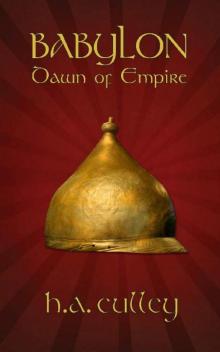 Dawn of Empire
Dawn of Empire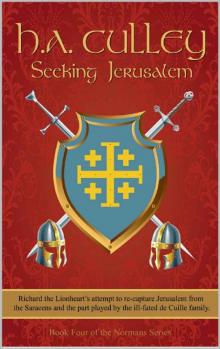 Seeking Jerusalem
Seeking Jerusalem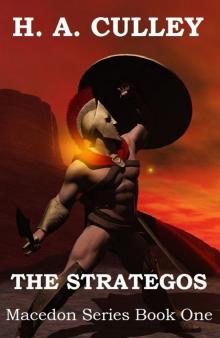 The Strategos
The Strategos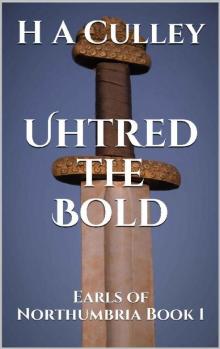 Uhtred the Bold
Uhtred the Bold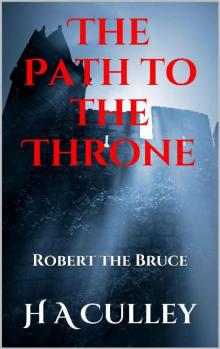 The Path to the Throne
The Path to the Throne The Bastard's Son
The Bastard's Son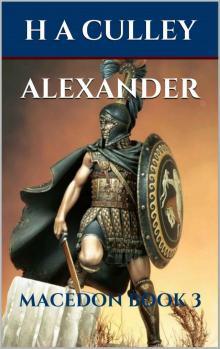 Alexander
Alexander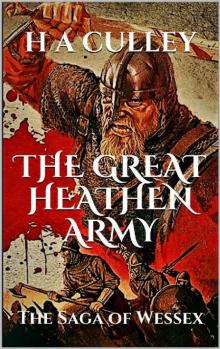 The Great Heathen Army
The Great Heathen Army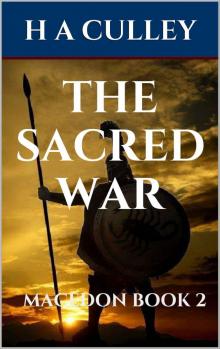 The Sacred War
The Sacred War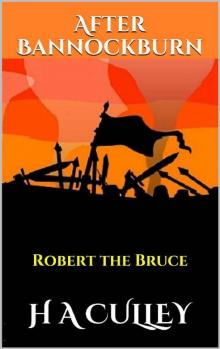 After Bannockburn
After Bannockburn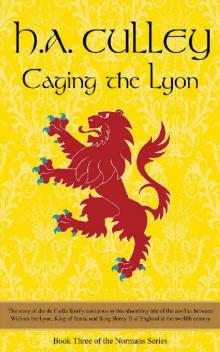 Caging the Lyon
Caging the Lyon The Bastard's Crown
The Bastard's Crown WHITEBLADE
WHITEBLADE TREASONS, STRATAGEMS AND SPOILS: Kings of Northumbria Book 6
TREASONS, STRATAGEMS AND SPOILS: Kings of Northumbria Book 6 THE POWER AND THE GLORY: Kings of Northumbria Book 4
THE POWER AND THE GLORY: Kings of Northumbria Book 4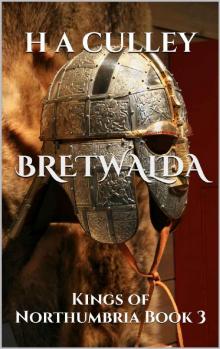 BRETWALDA: Kings of Northumbria Book 3
BRETWALDA: Kings of Northumbria Book 3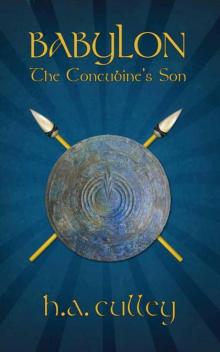 The Concubine's Son
The Concubine's Son The Fall of the House of Æthelfrith: Kings of Northumbria Book 5
The Fall of the House of Æthelfrith: Kings of Northumbria Book 5 TREASONS, STRATAGEMS AND SPOILS
TREASONS, STRATAGEMS AND SPOILS THE POWER AND THE GLORY
THE POWER AND THE GLORY WARRIORS OF THE NORTH
WARRIORS OF THE NORTH The Fall of the House of Æthelfrith
The Fall of the House of Æthelfrith WARRIORS OF THE NORTH: Kings of Northumbria Book 2
WARRIORS OF THE NORTH: Kings of Northumbria Book 2 WHITEBLADE: Kings of Northumbria Book 1
WHITEBLADE: Kings of Northumbria Book 1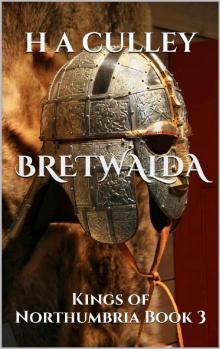 BRETWALDA
BRETWALDA